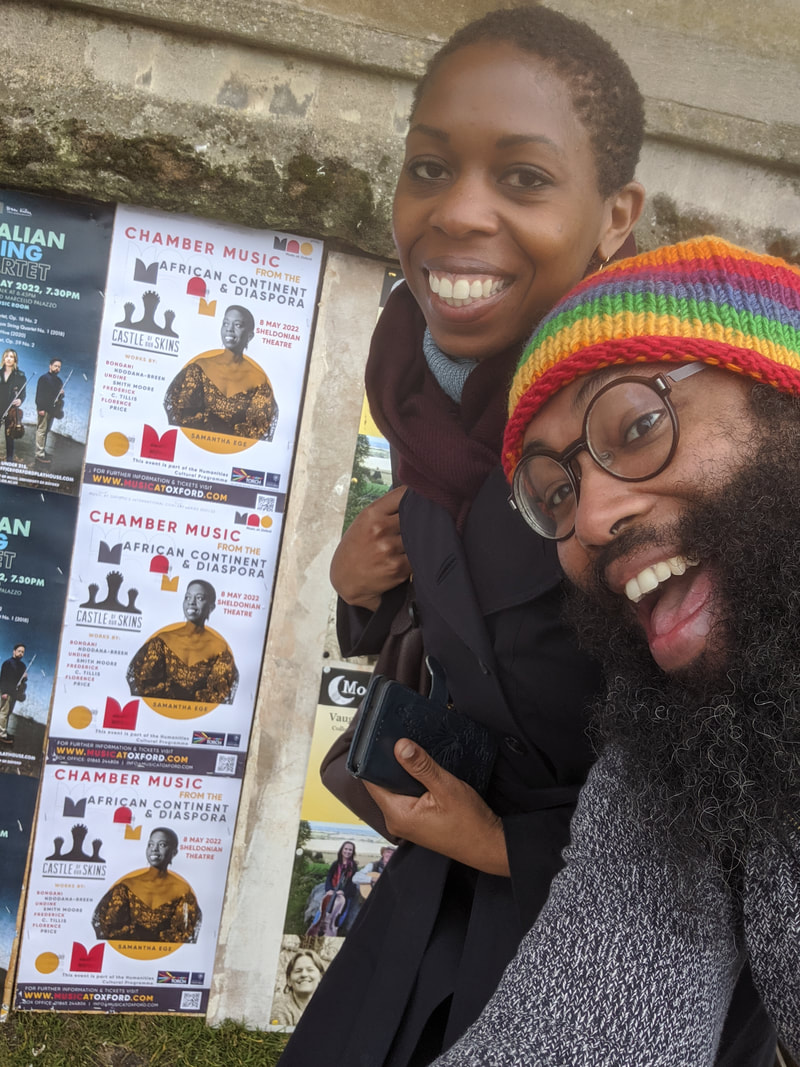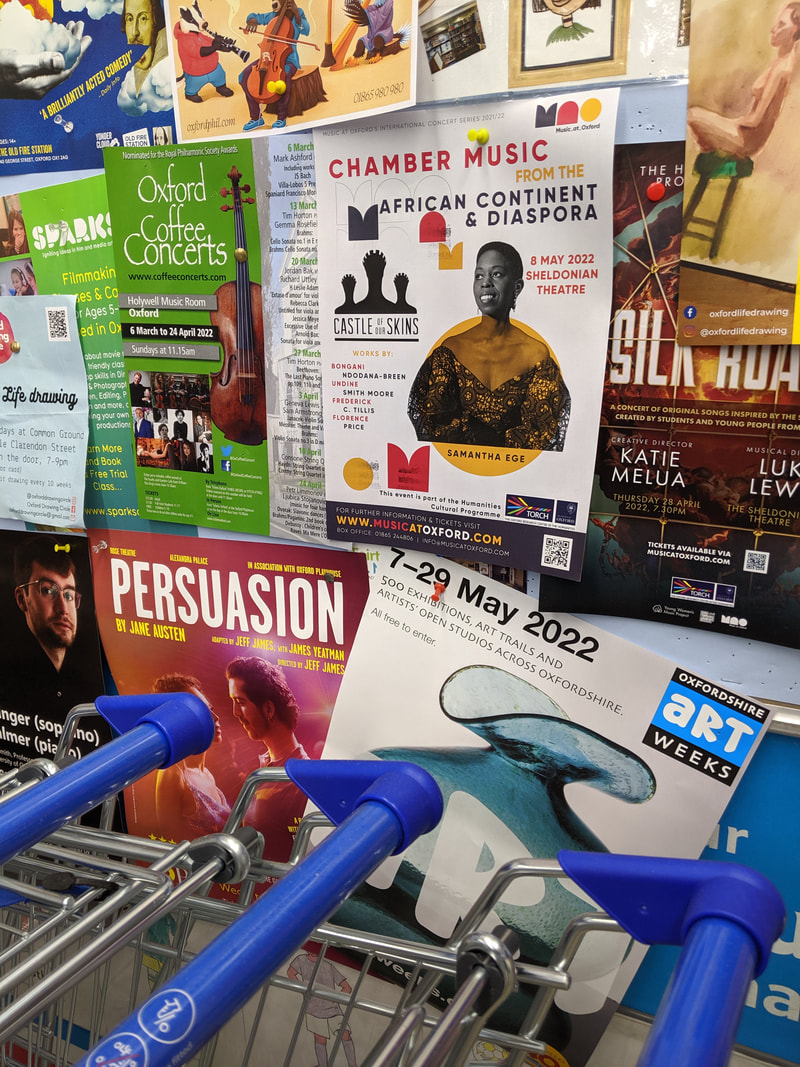|
by Anthony R. Green Before today's Castle of our Skins collaboration concert in Oxford, UK, I got a chance to visit Dr. Samantha Ege in Oxford. It was my second time in this quaint, charming town, with such a rich history. Dr. Ege showed me parts of Oxford I had not before seen, and coming across the posters with the Castle of our Skins logo and Dr. Ege's beautiful picture on them filled me with so much joy! Dr. Ege's work as a musicologist and piano performer speaks volumes in this interview, and I hope you learn from her mind and soul as much as I did on that beautiful, British spring day! AG : Thank you so much for everything! I would love for you to discuss this project, your role in it, and anything else!
DSE : A Castle of our Skins collaboration has been in the works for a couple of years now, and it wasn’t really until I got this post as the Lord Crewe Junior Research Fellow in Music at the University of Oxford that I felt that the stars had fully aligned to realize this project. There’s an entity here called the Oxford Research Center for the Humanities, and they immediately reached out to me in 2020 when I started this position to let me know what was available to me not just as a musicologist but also as a performer – someone who brings history to life through performance. It was immediately clear to me that we needed to do something with Castle of our Skins. So, this residency really brings together our two worlds: with me as a musicologist and pianist amplifying composers of African descent and Castle of our Skins as an educational series and chamber group. And how, obviously being based in different geographies, we have different approaches but we also have a lot in common. So the stars aligned to be able to bring Castle of our Skins to Oxford, and to really show this place what it is that we do! AG : Awesome! And Castle of our Skins is eternally grateful for this collaboration! Earlier in the lovely tour you gave me around Oxford, you mentioned that the spaces where the performances and events are happening have been occupied earlier by people (and now spirits) who may not have been amenable to Blackness. I would love for you to comment more about bringing Blackness to these spaces and what this means not only to you professionally but also in your role at Oxford in your wonderful fellowship. DSE : We recently had this discussion about how it has been so propagandized for “classical music” to be understood as a “European” art form. Even in non-European places, like the US or North America, it has still been absorbed into ideas about what constitutes whiteness. It just further propagandizes a means to exclude Black people from accessing a history that, as we’ve discussed, is as much ours as it is anyone else’s. Especially in a place like Oxford which has so much to do with that history of exclusion – there is a more recent history of trying to remedy that, but music has a way of initiating conversations and changing mindsets in a way that words and other kinds of actions aren’t always able to achieve. So for us – as people who play this repertoire not as a gimmick, not to tick a diversity box, but because we believe in this music and we believe in ourselves as well and our ability to do this – it means a lot to have then found the support to be able to bring this to fruition, and to play a kind of music where people have this idea that that’s not what Black people do – we’re not only playing it, but we’re playing it in one of the most important centers for performance in this city. AG : Excellent. AMEN! And excellent! This program has a representation of Black composers from across cultures, diasporas, geographies. A South African composers, a US American Black woman composer – Undine Smith Moore, a US American Black male composer – Frederick Tillis … and this amalgamation of not only different realizations of Blackness but also different representations of cultures, geographies, languages, mindsets, time periods as well – for me, it implies that this project is also an amalgamation of snapshots from history, geography, and from philosophy as well. Your research has centered Florence Price and also European women. I would love for you to talk about the way your research is in dialogue with the composers represented on this program. DSE : Interestingly Price is on this program and I’m not playing her music! (Laughs!) And that has made me expand my horizons both as a musician and a historian. Learning about South African culture through Dr. Bongani Ndodana-Breen’s music has been really eye-opening for me in that when he describes the different movements in his dissertation (which I’ve spent a lot of time with now) and he describes experiences of oppression and forced migration, and then I’m playing the musical sound words that evoke those experiences, I feel as though I’m gaining a learning experience that you can’t attain from simply reading a book. So I feel a lot of growth as a musician, also because there are a lot of indigenous ideas in Bongani’s music with which I’m not familiar. So again I’m really being pushed to think about Blackness in more expansive ways as well. With Undine Smith Moore: I feel like I can relate to her piece a lot – her piece is called Soweto – because what she’s doing is not absorbing South African musical languages but she is finding a sense of connection and solidarity through her experiences as a Black woman being able to convey rage towards apartheid South Africa. I feel that, when I see injustices in the US towards Black Americans, I feel that sense of, yes while that’s not my experience, there is a sense of solidarity and anger and rage that I feel. So when she experiences that and puts that into music, I think that’s such a powerful thing. It shows, as well, that, to have that sense of commentary or solidarity, you don’t have to appropriate. If you don’t know the language, you don’t have to pretend that you do. You can find other ways of connection and access. My background is Nigerian and Jamaican. That’s not reflected in this program, but I feel such a connection to these composers and I feel that through my performances I’m able to express a solidarity and a connection. AG : That’s such a beautiful observation, and I haven’t come across this concept as clearly as you’ve just articulated it – this concept of not only learning culture through music practice, but also, along with learning culture, learning empathy. Over the past 5 years, empathy has been quite a focus in my practice. It has helped me define who I want to be as a social justice artist, but it also has molded or clarified paths for me to avoid appropriation, as you’ve mentioned, and really to find commonality through a cultural understanding and with a cultural practice that you’re not belittling or simplifying. With that, I want to take it back to the second question: in bringing this music to Oxford, to these very specific spaces, as well as the empathy you’re experience by playing Undine Smith Moore and observing how your cultural background is in conversation with the music on this program, what would you like the audience to empathize with during this performance and after? DSE : Well, there’s a strong sense of narrative in all of the music on the program, and that narrative stems from a sense of cultural memory. The thing is, all of these histories belong to everyone. And I don’t mean that in a sort of “hold hands” kind of way, what I mean is that the history within Bongani’s work and within Undine Smith Moore’s work is a history of South Africa [that’s being presented through music] in a place where there’s a statue of Cecil Rhodes. His legacy is everywhere here. So this is not just a Black history, this is a history of this place, Oxford, as well. We have these institutions that are very much entwined with and built off the cultural creatives behind these works that we’re listening to. For example, The Spiritual Suite : each movement is based on a spiritual, on a song of the enslaved. Now look at the opulence around us in this place and there’s a direct tie. That’s what I mean when I say this history belongs to all of us. It’s not meant to make everyone feel good, you know, but that’s the truth of it, and I hope that people experience that connection and that sense of empathy as well, realizing this through music. Music has a way of explaining and articulating things in different ways, so often times difficult conversations are met with defensiveness. Perhaps through music we can find another way to experience these discomforts and have these conversations. AG : Amazing. Thank you so much!! DSE : Thank you!
1 Comment
Hema Roopnarin
10/18/2022 08:10:35 am
My life is full of happiness because Dr Ameosa , make me to be happy. What happened to me is not what i can keep only to myself but to also tell the world so that those that were once like me will get their love ones back and been happy once again. I and my lover had some issues which leads to our break up, since after then my life has never been the same, i tried all method to get him back. but they were just waste of effort and waste of time. But one day during my search on the internet, i came across someone testimony about Dr Ameosa, i contact him and explain my problem to him am still very much surprise till now how he was able to bring back my lover within 24 hours. With this great thing that happened in my life i decided to tell the whole world about this great man called Dr Ameosa , For those in need of anything he told me that in his temple there is know impossibility now i believe him so much. friends, if you need help to bring back your ex lover kindly contact him via email: [email protected] You can also WhatsApp him on +2347052898482. And i promise you that your lover will definitely come back to you.
Reply
Leave a Reply. |
Details
Writings, musings, photos, links, and videos about Black Artistry of ALL varieties!
Feel free to drop a comment or suggestion for posts! Archives
May 2024
|
Member Login
Black concert series and educational programs in Boston and beyond



 RSS Feed
RSS Feed










